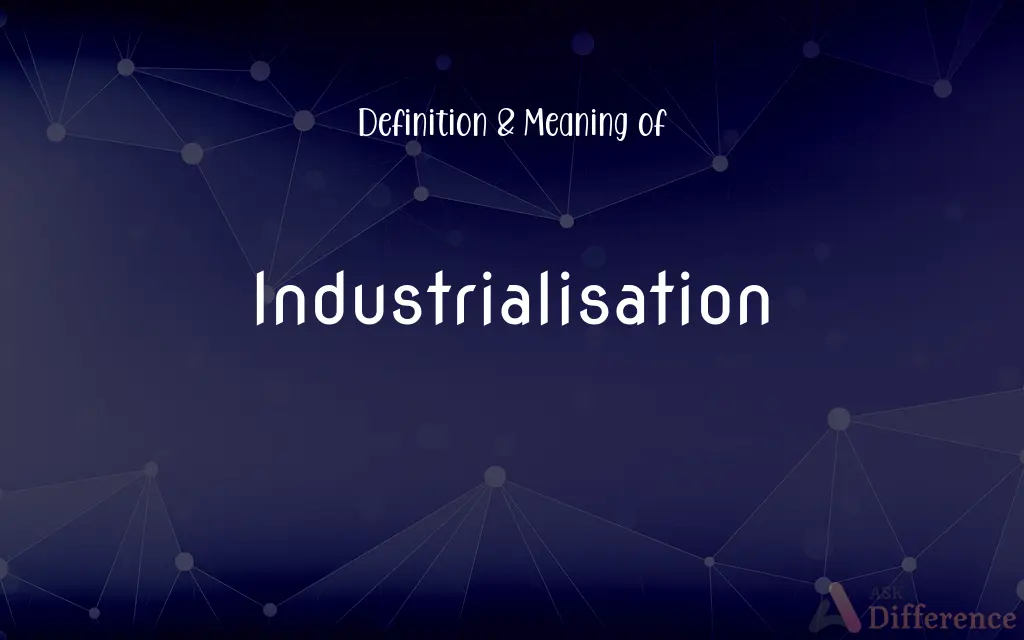Industrialisation Definition and Meaning
Industrialisation is the process by which an economy is transformed from primarily agricultural to one based on the manufacturing of goods. e.g., The industrialisation of the country led to significant urban development.

Table of Contents
Industrialisation Definitions
The development of industries in a country or region on a wide scale.
Industrialisation brought about significant urban growth.
The period of social and economic change that transforms a society from agrarian to industrial.
Industrialisation was accompanied by significant technological innovations.
The process of introducing industry to an area for the first time.
Industrialisation in the region was sparked by the discovery of coal.
The process leading to increased mechanization and factory production.
Industrialisation led to the rise of the factory system.
The increase in production and economic activity due to the use of machines.
Industrialisation boosted the economy but also led to environmental concerns.
The transition from manual agricultural production to machine-based manufacturing.
Industrialisation shifted the workforce from farms to factories.
The spread of industrial technology and factory systems.
Industrialisation spread from Britain to other parts of the world.
The adoption of industrial methods of production and manufacturing.
With industrialisation, goods could be produced more quickly and efficiently.
The growth of sectors such as manufacturing, mining, and construction.
Industrialisation was marked by the expansion of the steel industry.
The change in economic focus from agriculture to manufacturing and services.
Industrialisation changed the employment landscape, with more jobs in urban areas.
(British spelling) industrialization
The development of industry on an extensive scale
Industrialisation Snonyms
Mechanization
The process of changing from working largely or exclusively by hand to doing that work with machinery.
Mechanization was a key aspect of industrialisation.
Urbanization
The process of making an area more urban, typically associated with industrialisation.
Urbanization often follows the path of industrialisation.
Industrial revolution
The rapid development of industry that occurred in Britain in the late 18th and 19th centuries.
The Industrial Revolution is often synonymous with the beginning of industrialisation.
Modernization
The process of adapting something to modern needs or habits, often through industrialisation.
Modernization through industrialisation transformed many societies.
Manufacturing boom
A rapid increase in the production of goods, especially in the manufacturing sector.
The manufacturing boom was a clear sign of industrialisation.
Automation
The use of largely automatic equipment in a system of manufacturing.
Automation further advanced the goals of industrialisation.
Technological advancement
Progress in technology that can lead to the industrialisation of a region or country.
Technological advancement paved the way for industrialisation.
Industrial growth
The expansion of the industrial sector of an economy.
Industrial growth is both a cause and an effect of industrialisation.
Economic development
The process by which the economic well-being and quality of life of a nation, region, or local community are improved.
Industrialisation is a key factor in economic development.
Factory system
A method of manufacturing using machinery and division of labor.
The factory system is a hallmark of industrialisation.
Industrialisation Idioms & Phrases
The backbone of industrialisation
The fundamental support system for industrialisation.
Coal mining was once seen as the backbone of industrialisation.
The wheels of industrialisation
The essential processes that keep industrialisation moving forward.
The wheels of industrialisation turned faster with the advent of steam power.
The building blocks of industrialisation
The essential elements or principles on which industrialisation is based.
Education and infrastructure are the building blocks of industrialisation.
The footprint of industrialisation
The impact or mark left by industrialisation on society and the environment.
The footprint of industrialisation is evident in the polluted rivers and landscapes.
The pace of industrialisation
The speed at which industrialisation occurs.
The pace of industrialisation accelerated with new inventions.
Engines of industrialisation
Factors that drive the process of industrialisation.
Innovation and investment are considered engines of industrialisation.
The fabric of industrialisation
The basic structure underlying industrialisation.
The fabric of industrialisation is woven from technological, economic, and social threads.
To fuel industrialisation
To stimulate or drive the process of industrialisation.
Cheap coal and iron ore helped to fuel industrialisation.
The pioneers of industrialisation
The first people or groups to begin the process of industrialisation in a region.
The pioneers of industrialisation are often celebrated for their vision and innovation.
The casualties of industrialisation
Those who suffer or are negatively impacted by industrialisation.
Workers exploited in unsafe conditions were among the casualties of industrialisation.
Industrialisation Example Sentences
Many rural workers moved to cities to find work during industrialisation.
The textile industry was among the first to undergo industrialisation.
Industrialisation has been linked to both economic prosperity and social challenges.
Governments often encourage industrialisation to boost economic development.
Industrialisation led to the rise of a new middle class.
The impact of industrialisation on traditional cultures has been profound.
Industrialisation played a pivotal role in shaping the modern world.
Environmental concerns have grown with the pace of industrialisation.
The rapid industrialisation of the 19th century transformed many societies.
Industrialisation brought about significant advancements in transportation.
Labor laws and worker rights became important issues during industrialisation.
The debate on the environmental cost of industrialisation is ongoing.
Industrialisation required significant capital investment in machinery and factories.
Common Curiosities
Why is it called "industrialisation"?
It's called "industrialisation" because it marks the period or process where societies transform from primarily agrarian economies to industrial ones, focusing on the mass production of goods and services.
How is "industrialisation" used in a sentence?
"Industrialisation led to significant changes in the economy and society."
What is a stressed syllable in "industrialisation"?
In "industrialisation," the stressed syllable is the third one: "tri".
What is the pronunciation of "industrialisation"?
"Industrialisation" is pronounced as /ɪnˌdʌstriəlaɪˈzeɪʃən/.
What is the first form of "industrialisation"?
"Industrialisation" does not have a "first form" as it is a noun. The related verb form "industrialise" would be considered its base or first form.
What is the root word of "industrialisation"?
The root word of "industrialisation" is "industry".
What is the second form of "industrialisation"?
"Industrialisation" as a noun does not have a second form. For the related verb "industrialise," the second form would be "industrialised".
What part of speech is "industrialisation"?
"Industrialisation" is a noun.
What is the singular form of "industrialisation"?
"Industrialisation" is already in its singular form.
How many syllables are in "industrialisation"?
"Industrialisation" has seven syllables.
How do we divide "industrialisation" into syllables?
"Industrialisation" is divided into syllables as "in-dus-tri-al-i-sa-tion".
What is the verb form of "industrialisation"?
The verb form of "industrialisation" is "industrialise" (or "industrialize" in American English).
Is "industrialisation" a noun or adjective?
"Industrialisation" is a noun.
Which vowel is used before "industrialisation"?
The vowel "i" is used at the beginning of "industrialisation."
What is the third form of "industrialisation"?
"Industrialisation" as a noun does not have a third form. For the related verb "industrialise," the third form would be "industrialised".
What is the plural form of "industrialisation"?
The plural form of "industrialisation" is "industrialisations".
Is "industrialisation" an adverb?
No, "industrialisation" is not an adverb; it is a noun.
Is the word "industrialisation" Gerund?
No, "industrialisation" is a noun, not a gerund. The gerund form of the related verb "industrialise" would be "industrialising".
Is "industrialisation" a negative or positive word?
"Industrialisation" can be seen as either negative or positive, depending on the context and perspective. It is often associated with economic growth and progress but also with environmental degradation and social disruption.
Is "industrialisation" a vowel or consonant?
The word "industrialisation" begins with a vowel sound (/i/).
Is "industrialisation" a collective noun?
No, "industrialisation" is not typically considered a collective noun.
Is the word "industrialisation" imperative?
No, "industrialisation" is a noun and not used in the imperative mood.
Which article is used with "industrialisation"?
The definite article "the" or the indefinite articles "a" or "an" can be used with "industrialisation," depending on the context.
What is another term for "industrialisation"?
Another term for "industrialisation" could be "mechanization" or "modernization", depending on the context.
Is the "industrialisation" term a metaphor?
"Industrialisation" can be used metaphorically to describe rapid development or transformation in a non-industrial context, but it is primarily a literal term.
Is the word “industrialisation” a Direct object or an Indirect object?
As a noun, "industrialisation" can serve as either a direct object or an indirect object in a sentence, depending on the sentence structure.
Which determiner is used with "industrialisation"?
Determiners like "the," "this," "that," "some," and "any" can be used with "industrialisation," depending on the context.
Which preposition is used with "industrialisation"?
Prepositions such as "during," "since," and "after" can be used with "industrialisation," depending on the sentence.
Which conjunction is used with "industrialisation"?
Conjunctions like "and," "but," "or," and "while" can be used with "industrialisation" to connect clauses.
What is the opposite of "industrialisation"?
The opposite of "industrialisation" could be "deindustrialisation" or "agrarianism", depending on the context.
Is "industrialisation" an abstract noun?
Yes, "industrialisation" is an abstract noun as it refers to a process or period rather than a tangible object.
Is "industrialisation" a countable noun?
"Industrialisation" is generally used as an uncountable noun, but it can be countable in contexts where different types or instances of industrialisation are discussed.
Share Your Discovery

Previous Term
See Definition and Meaning
Next Term
Conniption Definition and Meaning
































